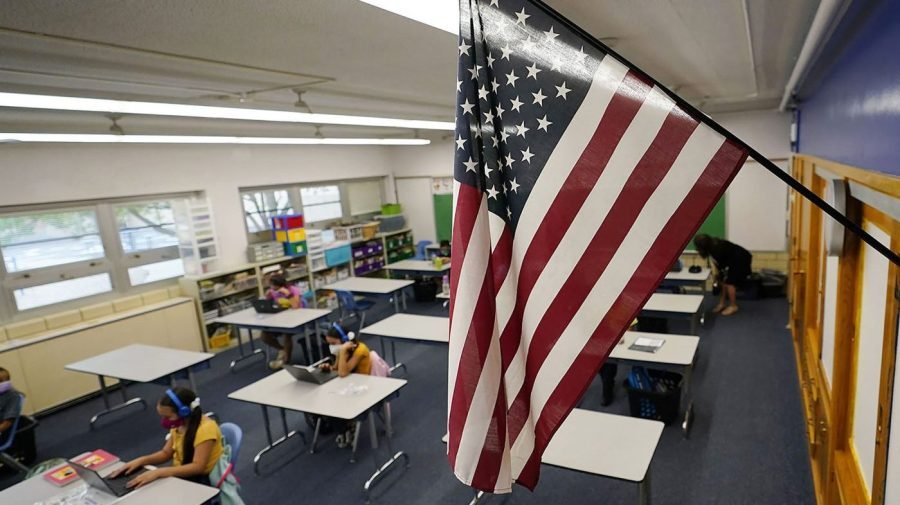
The National Assessment of Education Progress (NAEP) offered a grim outlook Tuesday for 8th and 12th grade students in their first results since before the COVID-19 pandemic.
Scores dropped to the lowest in decades for reading and math scores among high school seniors, along with declines in 8th grade science.
The results raise concerns on workforce readiness among those leaving high school, as well as questions about how to reverse negative trends that began before the pandemic.
Scores drop for 12th, 8th grade students
What is commonly called Nation’s Report Card showed 12th grade students saw their lowest scores in reading and math in decades.
In math, 45 percent of high school seniors scored below “basic,” the lowest since 2005. In reading, 32 percent in the exam taken last year scored below “basic,” the lowest since the exam began in 1992.
For 8th graders in science, 38 percent scored below “basic,” meaning they wouldn’t be able to recall simple facts such as plants needing sunlight to grow.
The drops were seen across racial and ethnic groups.
Along with declines in test scores, the achievement gap between the highest performing and lowest performing students continued to widen in all areas except 12th grade reading, which stayed around the same.
“Scores for our lowest-performing students are at historic lows,” said Matthew Soldner, the acting commissioner of the National Center for Education Statistics, the Associated Press reported. “These results should galvanize all of us to take concerted and focused action to accelerate student learning.”
Drop in student readiness for college
Amid declines in 12th grade scores, college readiness has dropped as more students enter higher education.
In math, only 33 percent of high school seniors are considered college-ready, and only 35 percent are college-ready on reading.
The findings are concerning leaders for the future of the workforce, especially one that may be dominated by artificial intelligence.
“Today’s NAEP scores continue to show a devastating decline in math, science, and reading scores. Low academic skills don’t just hurt grades, they weaken our economy, workforce, and national security. Without strong foundations in these core subjects, America’s freedom and economic competitiveness will be in jeopardy,” House Education and Workforce Committee Chairman Tim Walberg (R-Mich.) said.
Declines began before COVID-19
Tuesday’s NAEP scores were of particular note as 12th graders in 2024 were in eighth grade when the pandemic began.
But the NAEP assessment has shown declines in student scores long before then.
Theories have been raised such as students spending more time on their phones and not doing as much reading for fun.
Back in 2023, NAEP found only 14 percent of students were reading for fun every day, with experts calling it a “crisis.”
“Looking at these NAEP assessments, we see a clear story that tells us students need more support to thrive in school and succeed across core subjects and across grades,” former North Carolina Gov. Beverly Perdue (D), who chairs the National Assessment Governing Board, said Tuesday.
Policymakers struggle to find solutions
Policymakers are struggling to find solutions to the decline in scores and pointing fingers across the aisle for the dismal results.
Some advocates are blaming Republicans, pointing to funding cuts on education.
“This is not a blip. This is not ‘learning loss.’ This is leadership failure. And while the gaps grow wider, House Republicans are considering a budget that would decimate federal education funding,” the National Parents Union said in a statement. “Leaders in Washington must treat this like the emergency it is. That means immediate, sustained investment in evidence-based instruction, real support for teachers, and urgent strategies to accelerate learning for the students left furthest behind.”
Republicans, however, say funding will not fix the issue and education decisions need to be made at a more local level to address the core problems.
“Despite spending billions annually on numerous K-12 programs, the achievement gap is widening, and more high school seniors are performing below the basic benchmark in math and reading than ever before,” Education Secretary Linda McMahon said.
“The lesson is clear. Success isn’t about how much money we spend, but who controls the money and where that money is invested. That’s why President Trump and I are committed to returning control of education to the states so they can innovate and meet each school and students’ unique needs,” she added.
While the debate continues, some states are changing the ways educators teach reading and math to try to reverse the trend.






